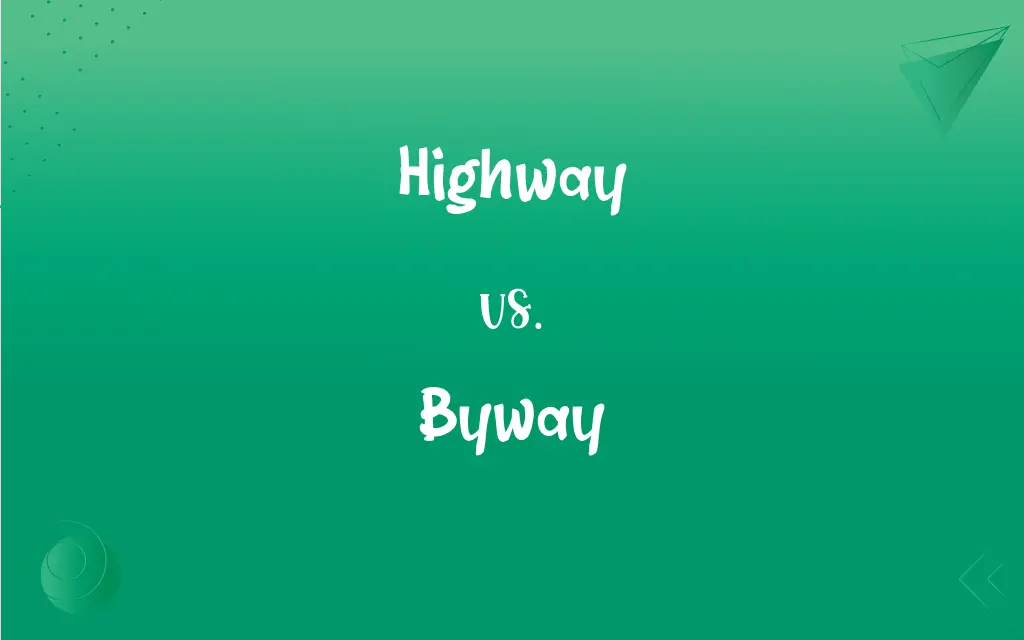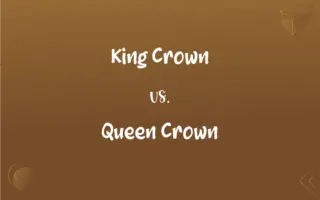Highway vs. Byway: What's the Difference?
Edited by Aimie Carlson || By Harlon Moss || Updated on June 20, 2024
Highway refers to a major road, especially one connecting major destinations. Byway refers to a small, often rural road, less traveled than a highway.

Key Differences
A highway is a main road, typically designed for fast and efficient transportation, often connecting cities and towns. In contrast, byways are smaller roads, less traveled, often found in rural or less populated areas.
Highways are characterized by higher speed limits and smoother traffic flow, accommodating long-distance travel. However, byways are known for their scenic routes and slower pace, providing a more leisurely driving experience.
Highways are essential for economic connectivity and are often multi-lane, while byways offer local access and are usually single-lane roads. Highways often have controlled access points to manage traffic flow.
Highways are generally well-maintained and funded by state or federal governments. Byways, on the other hand, may have less regular maintenance and are often managed by local authorities.
The term 'highway' reflects a road of significant importance and capacity. 'Byway' suggests a less prominent, more tranquil route, often chosen for leisurely travel or scenic value.
ADVERTISEMENT
Comparison Chart
Definition
A major road for fast, efficient transportation
A smaller, often rural road, less traveled
Traffic Flow
Higher speed limits, smoother traffic
Slower pace, scenic routes
Purpose
Long-distance travel, economic connectivity
Local access, leisurely or scenic travel
Maintenance and Funding
Well-maintained, state or federal funding
Less regular maintenance, local funding
Characteristics
Often multi-lane, controlled access
Usually single-lane, more tranquil
ADVERTISEMENT
Highway and Byway Definitions
Highway
A major road system for long-distance travel.
They took the highway to reach their destination faster.
Byway
A small, secondary road, often in rural areas.
The scenic byway offers beautiful countryside views.
Highway
A road designed for high-speed vehicular traffic.
The new highway has reduced travel time significantly.
Byway
A rural or minor road, often scenic.
The byway is popular among cyclists for its scenery.
Highway
An arterial road with higher speed limits.
The highway bypasses small towns to facilitate quicker travel.
Byway
A road less frequented, offering a quieter route.
The byway winds through several quaint villages.
Highway
A state or federally funded road for transportation.
The government announced the expansion of the highway.
Byway
A less-traveled road, not a main thoroughfare.
They explored the region via its quiet byways.
Highway
A main public road, especially for fast travel.
The interstate highway connects several major cities.
Byway
An alternative, often slower route to a destination.
They took a byway to avoid the highway traffic.
Highway
A main public road, especially one connecting towns and cities.
Byway
A side road. Also called byroad.
Highway
(historical) A road that is higher than the surrounding land and has drainage ditches at the sides
Byway
A secondary or arcane field of study.
Highway
A main public road, especially a multi-lane, high-speed thoroughfare.
Byway
A road or track not following a main route; a minor road or path.
Highway
(figurative) A way; a path that leads to a certain destiny
You're on a highway to greatness.
Byway
A road that is not frequently travelled.
Highway
Any public road for vehicular traffic.
Byway
(by extension) a little-known or arcane field of study or detail.
Highway
(computing) bus
Byway
A secluded, private, or obscure way; a path or road aside from the main one.
Highway
To travel on a highway
Byway
A side road little traveled (as in the countryside)
Highway
A road or way open to the use of the public, especially a paved main road or thoroughfare between towns; in the latter sense it contrasts with local street; as, on the highways and byways.
Highway
A major road for any form of motor transport
FAQs
What is a byway?
A smaller, often rural road, less traveled than a highway.
Can byways be scenic routes?
Yes, byways often offer scenic or leisurely routes.
What's the purpose of a highway?
To connect cities and towns, facilitating long-distance travel.
What's the purpose of a byway?
For local access, scenic drives, and leisurely travel.
Do highways have higher speed limits?
Typically, highways have higher speed limits for efficient travel.
Are highways funded by the government?
Yes, highways are often funded by state or federal governments.
Are byways less busy than highways?
Yes, byways are usually less traveled and quieter.
What is a highway?
A main road designed for fast and efficient travel.
Are highways always bigger than byways?
Generally, highways are larger and have more lanes.
Can you find rest stops on highways?
Yes, highways often have designated rest stops for travelers.
Do byways pass through towns?
Often, byways pass through small towns and villages.
Do byways have historical significance?
Many byways are historically significant, offering cultural insights.
Are highways safer than byways?
Highways are designed for safety at high speeds, but conditions vary.
Who maintains byways?
Byways are usually maintained by local authorities.
Is it faster to travel on a highway?
Generally, yes, due to higher speed limits and direct routes.
Do highways connect to major airports?
Highways often provide the primary routes to major airports.
Are byways suitable for all vehicles?
Most are, but some rural or unpaved byways may not be suitable for all vehicle types.
Are byways good for biking?
Yes, byways are often popular for biking due to their scenic nature and less traffic.
Are there tolls on highways?
Some highways have tolls, depending on the region and road.
Can byways be unpaved?
Yes, some byways, especially in rural areas, can be unpaved.
About Author
Written by
Harlon MossHarlon is a seasoned quality moderator and accomplished content writer for Difference Wiki. An alumnus of the prestigious University of California, he earned his degree in Computer Science. Leveraging his academic background, Harlon brings a meticulous and informed perspective to his work, ensuring content accuracy and excellence.
Edited by
Aimie CarlsonAimie Carlson, holding a master's degree in English literature, is a fervent English language enthusiast. She lends her writing talents to Difference Wiki, a prominent website that specializes in comparisons, offering readers insightful analyses that both captivate and inform.







































































